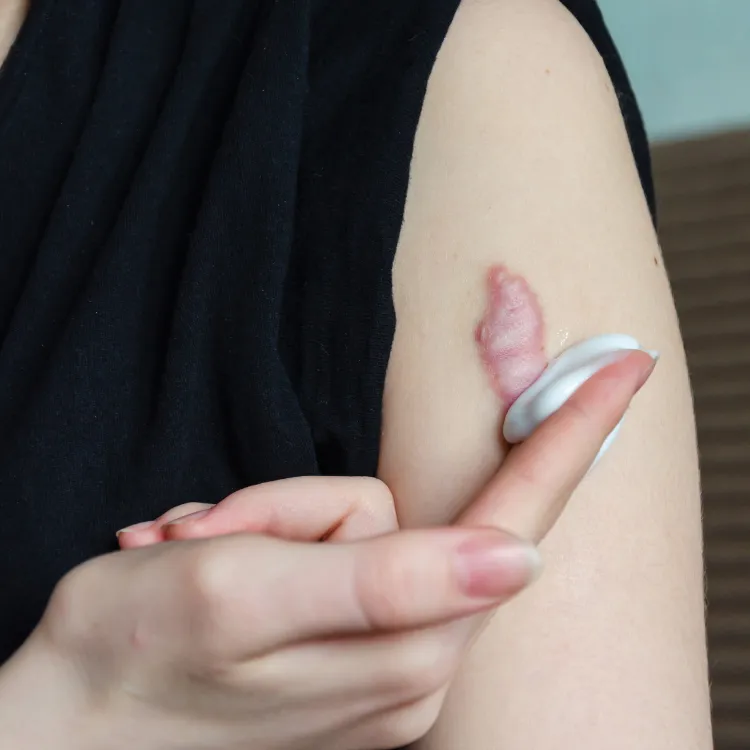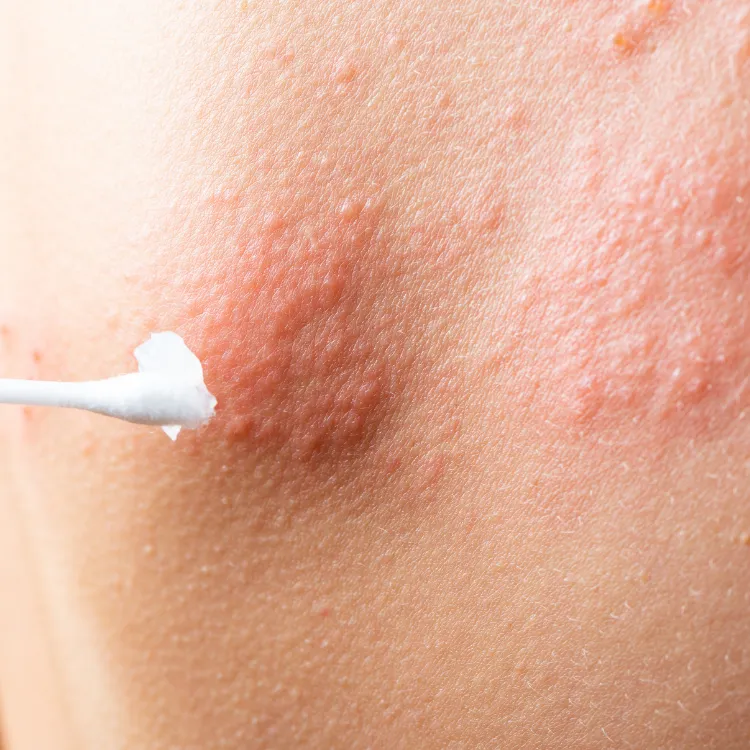Eczema
Eczema, a chronic skin condition, is not usually a serious medical issue, but it can cause significant discomfort and affect a person’s quality of life. While it isn’t contagious, its visible appearance and symptoms, especially when persistent can impact daily routines. Eczema can occur for a variety of reasons and often appears on different parts of the body. So, what exactly is eczema, and what are its symptoms?
Choose Your Topic
Get in Touch
Get professional treatments in Turkey at Lygos Clinic, offering effective, affordable treatments for a healthier and more aesthetically pleasing life.
You can contact us via WhatsApp and Instagram for a quick response.

What is Eczema?
Eczema refers to a group of skin conditions that cause inflammation, redness, itching, and dryness. It often presents with blisters that can dry, flake, and eventually crack. These cracks in the skin can make it easier for bacteria and other microorganisms to enter, increasing the risk of infection.
Eczema can appear at any age and is commonly found on the hands, face, scalp, legs, elbows, knees, and buttocks. Common causes include allergic reactions, stress, poor circulation, and irritants. When associated with allergies, eczema may also be triggered by other health conditions.
What are the Symptoms of Eczema?
Eczema presents differently in each individual, but the most common symptoms include:
- Dry, cracked, or scaly skin
- Redness, inflammation, and itching
- Blistering or fluid-filled bumps that may ooze and crust
- Rash that worsens with scratching
- Dandruff and flaking in scalp-related cases
- Increased risk of infection if the skin is broken or inflamed


What are Eczema Treatment Methods?
Eczema treatment depends on the severity of the condition and the specific type affecting the patient. While there is no known permanent cure, symptoms can be effectively managed.
Treatment typically involves:
- Identifying and avoiding known triggers or irritants
- Using moisturizers regularly to keep the skin hydrated
- Applying corticosteroid creams to reduce inflammation and itching
- Taking antihistamines for itch relief
- Using topical or oral medications as prescribed
- Following a skincare routine recommended by a dermatologist
In some cases, light therapy (UV treatment) or newer biological drugs may be used under medical supervision.
How to Treat Eczema?
The approach to treating eczema includes:

Moisturizers: Use fragrance- and alcohol-free moisturizers multiple times daily.

Medications: Corticosteroid creams, antihistamines, or immunosuppressive drugs as prescribed.

Light Therapy: UV light treatment in chronic or severe cases.

Avoid Irritants: Identify and eliminate products that trigger allergic reactions.

Natural Methods: Natural oils (e.g., coconut oil) can reduce symptoms, but always consult a healthcare provider before using them.

Skin Care Routine: Use lukewarm water and emollient-based soap. Avoid hot water, and never scratch or burst blisters.
Scalp Eczema Treatment
Scalp eczema affects the scalp and hair follicles, causing red, itchy, and flaky patches. Causes include stress, allergies, genetics, and hormonal fluctuations.
Treatment options include:
- Medicated shampoos
- Topical creams
- Anti-inflammatory medications
- Natural oils for mild symptoms
Choice of treatment depends on the severity of the condition.


How to Treat Eczema on Hands?
Hand eczema can significantly disrupt daily life. It is typically managed with:
- Topical corticosteroids
- Antihistamines for itching
- Moisturizers applied frequently throughout the day
- Vegetable oils (natural option)
- Light therapy in chronic cases
Patients should avoid excessive handwashing with harsh soaps and follow medical advice on treatment duration to prevent irritation or worsening.
What are the Types of Eczema?
There are several types of eczema, each with unique causes and symptoms. These include:
Atopic Dermatitis
Seborrheic Dermatitis
Contact Dermatitis
Asteatotic Eczema
Nummular Eczema
Gravitational (Stasis) Eczema
Stress-Induced Eczema
A proper diagnosis by a specialist is essential to determine the type and appropriate treatment.
Allergic Eczema in Adults
Allergic eczema is a chronic form of eczema triggered by allergens. While mild cases may resolve quickly, more severe forms can be long-lasting.
Treatment involves:
- Avoiding allergens
- Regular use of moisturizers
- Short-term medication (as prescribed)
- Natural skin protection methods
An allergist should supervise long-term treatment to ensure effective symptom control.


Eczema Before and After
Eczema treatment not only relieves discomfort but also improves the skin’s appearance. With proper care, dry, inflamed skin can become soft and moisturized. This visible improvement can significantly enhance one’s quality of life.
Before-and-after comparisons often show a dramatic difference in skin condition, helping patients feel more confident and comfortable.
Eczema Treatment Costs
The cost of eczema treatment depends on:
- Severity and type of eczema
- Duration of the condition
- Type of treatment (e.g., creams, medications, light therapy)
- Brand and quality of products used
- Expertise of the treating physician
For personalized pricing and treatment plans, consult the specialists at Lygos Clinic.

Get in Touch
Get professional treatments in Turkey at Lygos Clinic, offering effective, affordable treatments for a healthier and more aesthetically pleasing life.
You can contact us via WhatsApp and Instagram for a quick response.
Frequently Asked Questions About Eczema Treatment
The duration of treatment depends on the severity of eczema, response to treatment, and individual factors. In some cases, eczema may persist throughout life, while in others, symptoms can become manageable.
BLOG

Is Breathing Through the Mouth Harmful?
Chose Your Topic Is Breathing Through the Mouth Harmful? Breathing is one of the most fundamental needs of life. However,

Does Rice Water Make Hair Grow? | Benefits of Rice Water
Chose Your Topic Does Rice Water Make Hair Grow? Natural methods in hair care have become quite popular in recent

Breast Lump | Types: Benign, Malign and Causes | LYGOS 2025
Breast Lump While cancer stands out as one of the most common health problems today, early diagnosis rates are also






